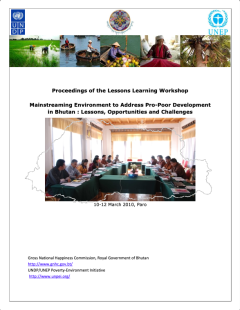
This report encapsulates the key takeaways from the Workshop held in Bhutan with two main objectives, namely;
- to take stock of environmental mainstreaming achievements to date, including Poverty-Environment Initiative (PEI) Phase I, and
- to discuss the challenges and opportunities of addressing environmental mainstreaming in the future.
The Poverty-Environment Initiative (PEI) is a global UNDP/ UNEP joint programme that aims to integrate pro-poor environmental considerations in planning and investment decision-making processes at the country level. PEI has supported events in several countries to generate information and discussion on country-specific experiences of mainstreaming environments. The workshops are conducted with a small group of people who represent key organizations in the government, civil society, and academia to discuss what is meant by environment mainstreaming, and what has happened in that particular country with respect to integrating the environment into the national development planning process. In some countries, these workshops were held at the initial stage of developing the PEI project and proved very useful in designing the PEI country programme structure.
In Bhutan there is already an ongoing PEI programme, Phase I of which was implemented from July 2008 to December 2009. Phase II implementation commenced in January 2010 in collaboration with the Government of Denmark and is titled the ‘Joint Support Programme: Capacity Development for Mainstreaming Environment, Climate Change and Poverty Concerns in Policies, Plans and Programmes’2 or Joint Support Programme (JSP) for short.
